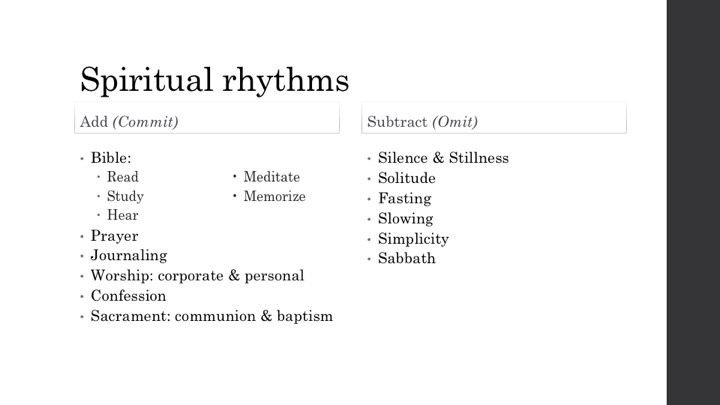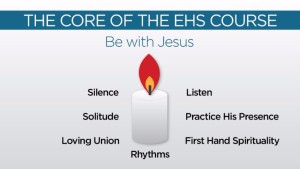Growth happens naturally, but healthy growth takes planning.
Once we learn to walk and feed ourselves, we can pretty much go anywhere and eat anything we want. Fortunately, God gave us parents to keep us from running away and living on Twinkies!
Like physical growth, healthy spiritual growth takes planning. Unfortunately, we don’t always have spiritual parents to help us grow into healthy, fruitful spiritual adults.
Over the next few weeks, I’m going to be a spiritual dad and write about the spiritual rhythms that make growth possible. Historically, these have been called spiritual disciplines. It’s a good but sometimes scary term, which is why I use the word rhythms instead. You can also think of them as predictable patterns or simple, repeatable patterns.
Spiritual rhythms fall into two broad categories: things to do and things to stop doing; add and subtract; commit and omit.
Each week, I’ll post about two rhythms. On Mondays, I’ll write about an add rhythm and on Thursdays, about a subtract rhythm. If these are new to you, then a week won’t be enough time to cement a new habit. Don’t worry about that; when you find something that works, stick with it long enough that you’ll miss it if you stop. That probably means three weeks or more.
Here’s a look at where we’re going:

Be sure to sign up to get these posts emailed to you each week. If other practices come to mind, I’ll add those; if there are any that have been particularly helpful to you, let me know. Wherever possible, I’ll also offer links and recommendations to helpful resources.

 Silence and stillness are the two most radical spiritual disciplines that need to be injected into a paradigm shift of how we do discipleship in our churches. They are indispensable to slow our people down so they cultivate a first-hand, personal relationship with Jesus.
Silence and stillness are the two most radical spiritual disciplines that need to be injected into a paradigm shift of how we do discipleship in our churches. They are indispensable to slow our people down so they cultivate a first-hand, personal relationship with Jesus.